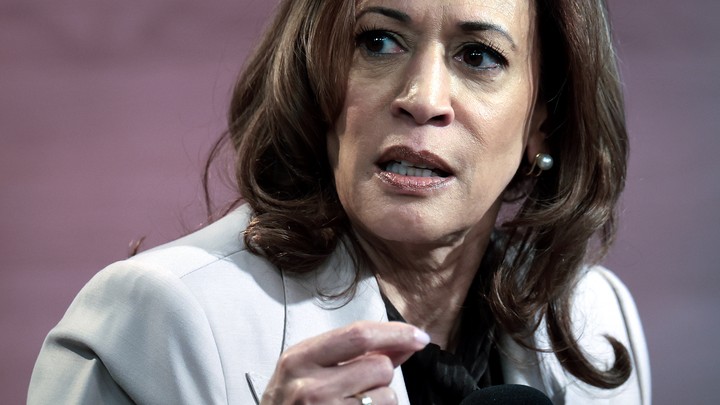This is an edition of The Atlantic Daily, a newsletter that guides you through the biggest stories of the day, helps you discover new ideas, and recommends the best in culture. Sign up for it here.
Donald Trump has long cast himself as Mr. Economy. The former president has claimed on the campaign trail that his last term saw “the best economy in the history of our country.” (He glosses over the economic crisis of 2020.) He has presented a slate of far-fetched ideas for how to bring down the cost of living and strengthen business. (See: “Drill, baby, drill”; his promises to impose massive tariffs; his idea to deport immigrants to open up more housing; and his suggestion that he himself wants to “have a say” in toggling interest rates, which he later walked back.)
Until a few months ago, voters—who say that the economy is the biggest campaign issue on their minds—appeared to be buying his pitch. In polls, Americans overwhelmingly said that they trusted him more than President Joe Biden to handle the economy. But much has changed in recent months: Once Kamala Harris became her party’s nominee, she quickly distinguished her campaign’s economic message from Biden’s, a strategy that has resonated with some voters. Last month, the Federal Reserve lowered interest rates for the first time in more than four years, effectively signaling to Americans that inflation is over—and triggering a stream of positive news coverage to that effect. Voters’ perceptions of the economy writ large have proved stubborn, but the American public seems more and more willing to entertain the idea that Harris could be a better leader than Trump on the issue.
Scarred by a period of high prices and inflation, Americans have been reluctant to accept the message—from Biden or from pundits—that the economy is good, actually, even though inflation cooled off significantly by 2023 and the unemployment rate has been near historic lows for much of the past three years. (Consumer sentiment has risen considerably since a mid-2022 nadir, but it’s still nowhere near pre-pandemic levels). Harris’s strategy so far has not focused on defending Biden’s record; instead, her campaign has attempted to differentiate her from the president—even as Trump has tried to present her as an extension of Biden’s legacy. “Whether or not Harris is ultimately saddled with Biden’s economic baggage may come down to who wins this narrative war,” my colleague Rogé Karma, who covers economics, told me.
Harris has focused on acknowledging the high cost of living and offering paths to combat it—a departure from Biden, who spent the past year trying desperately to convince voters that the economy was strong, Rogé said. Harris’s approach (which Rogé has called “Bidenomics without Biden”) seems to be working so far: One poll found that she had a one-point lead over Trump on the economy in September, just three months after Biden was running 11 points behind Trump on the issue. Other polls also show Trump’s edge as the trusted economy candidate shrinking. “The economy as an issue has gone from being the winning issue for Trump to a virtual tie,” Rogé explained.
Harris has gained on Trump, but this trend is not guaranteed to continue until November. One primary predictor of success for the incumbent party, Gabriel Lenz, a political-science professor at UC Berkeley, told me, is the growth of what economists call “real disposable income,” or Americans’ income after taxes and transfers—spending money, in other words. Right now, that metric is on the fence: “We’re not seeing that incomes are going up relative to inflation as much as they could be,” Lenz said. News stories can also shift voter perception in the final weeks of an election, even in our calcified political moment, Lenz argued. Historical precedent has been set for that: In 1992, for example, the economy was picking up before the election, but the fact that media coverage remained negative may have influenced the incumbent George H. W. Bush’s loss, Lenz suggested. (It didn’t help that Bill Clinton’s team did its best to tie Bush to that negative narrative: That election featured the infamous Clinton-campaign line “It’s the economy, stupid.”)
The broad realities of the American economy haven’t meaningfully changed since Harris entered the race, and Americans don’t suddenly feel rosy about it. But the messenger has changed, and that may be enough to compel some voters in this final stretch. Because many Americans are so far distinguishing Harris from the Biden administration’s economic policy, she has been able to take advantage of good economic news in a way that Biden never quite could.
Related:
Here are four new stories from The Atlantic:
- The elite college students who can’t read books
- What Democrats don’t understand about J. D. Vance
- The Christian radicals are coming.
- Lebanon is not a solution for Gaza, Gershom Gorenberg argues.
Today’s News
- Iran launched waves of ballistic missiles at Israel. The Israeli military did not immediately report any casualties, but a Palestinian man was reportedly killed by shrapnel in the occupied West Bank. Iran said that it had concluded its attack.
- Senator J. D. Vance and Minnesota Governor Tim Walz will face off tonight in the vice-presidential debate hosted by CBS News, airing at 9 p.m. ET.
- Claudia Sheinbaum, a former mayor of Mexico City, was sworn in as Mexico’s first female and first Jewish president.
Dispatches
- The Weekly Planet: After experiencing Kentucky’s 2022 floods, Annette Saunooke Clapsaddle moved to the mountains of North Carolina, where she thought she would be safe.
Explore all of our newsletters here.
Evening Read

Hurricane Helene Created a 30-Foot Chasm of Earth on My Street
By Chris Moody
We knew something had gone terribly wrong when the culverts washed up in our backyard like an apocalyptic art installation splattered with loose rock and black concrete. The circular metal tubes were a crucial piece of submerged infrastructure that once channeled water beneath our street, the primary connection to town for our small rural community just outside Boone, North Carolina. When they failed under a deluge created by Hurricane Helene, the narrow strip of concrete above didn’t stand a chance. Weighted down by a fallen tree, the road crashed into the river, creating a 30-foot chasm of earth near our house.
More From The Atlantic
- The bird-flu president
- “Dear James”: Wellness podcasts are absurd. Why am I obsessed with them?
- On loving and losing the Oakland A’s
- Dikembe Mutombo believed in the American idea.
Culture Break

Rewatch. The 2012 film Game Change (streaming on Max) knew exactly what was coming for American politics, James Parker writes.
Debate. Malcolm Gladwell’s insistence on ignoring the web in his new book, Revenge of the Tipping Point, is an even bigger blind spot today than it was when The Tipping Point came out, Gal Beckerman argues.
Stephanie Bai contributed to this newsletter.
When you buy a book using a link in this newsletter, we receive a commission. Thank you for supporting The Atlantic.
We want to hear what you think about this article. Submit a letter to the editor or write to letters@theatlantic.com.



